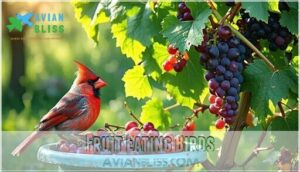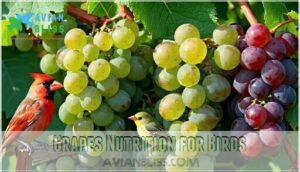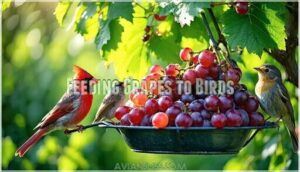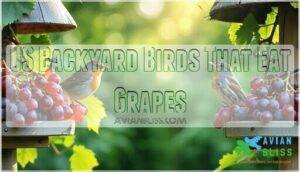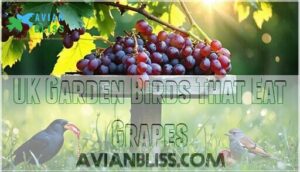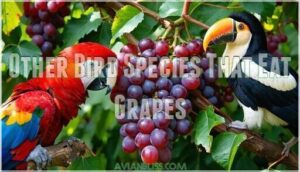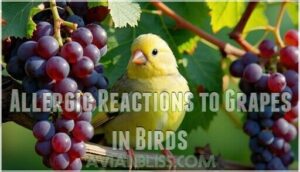This site is supported by our readers. We may earn a commission, at no cost to you, if you purchase through links.
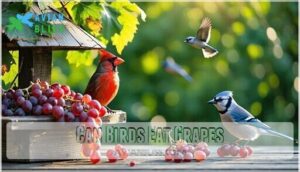
Wash grapes thoroughly to remove pesticides, then cut them into small pieces to prevent choking. Remove any seeds, as they can be harmful to smaller birds.
Many backyard birds like robins, cardinals, and mockingbirds enjoy grapes as an occasional treat. The natural sugars provide quick energy, especially during migration seasons.
However, grapes should only make up about 10% of a bird’s diet due to their high sugar content. Organic grapes are your best bet to avoid chemicals. Different bird species have varying tolerances and preferences regarding grape consumption.
Table Of Contents
Key Takeaways
- You can safely feed grapes to most backyard birds like robins, cardinals, and woodpeckers, but you’ll need to wash them thoroughly, cut them in half, and remove seeds to prevent choking hazards.
- Grapes should only make up about 10% of a bird’s diet since they’re high in sugar – treat them as occasional snacks rather than a main food source.
- You’ll get the best results by choosing organic grapes and offering them on platform feeders or scattered on the ground where birds can easily access them.
- While grapes provide beneficial vitamins C and K plus essential minerals, you should avoid feeding them to sensitive pet birds like canaries and budgerigars due to potential toxicity risks.
Birds Eating Grapes
You’ll find that many bird species can safely eat grapes, including robins, cardinals, woodpeckers, and bluebirds.
Many backyard birds, from robins to cardinals, can safely enjoy grapes as a nutritious treat.
Grapes provide essential vitamins C and K, along with important minerals like calcium that support your feathered visitors’ health and immune systems.
Types of Birds That Eat Grapes
Many bird species enjoy grapes as a natural treat.
Robins, woodpeckers, and waxwings are common grape enthusiasts in your backyard.
Grosbeaks and tanagers also relish these sweet fruits.
These frugivorous birds have adapted to eat various fruits, making grapes an excellent food source.
Cardinals, mockingbirds, and orioles will also visit your grape offerings regularly.
Grapes also provide essential vitamins that support bird health.
Benefits of Grapes for Birds
Grapes pack a nutritional punch for your feathered friends.
Sweet, juicy grapes deliver essential vitamins that keep your backyard birds healthy and thriving.
These sweet treats deliver essential vitamins and minerals that support overall bird health grapes in multiple ways.
Key grapes benefits for your backyard visitors:
- Immunity Boost – Vitamin C strengthens their natural defenses
- Feather Health – B vitamins promote vibrant plumage condition
- Energy Source – Natural sugars fuel daily activities
- Bone Strength – Calcium supports skeletal development
Risks of Feeding Grapes to Birds
Three main concerns arise when offering grapes to your feathered friends.
High sugar content can cause indigestion issues and weight gain in smaller birds. Pesticide exposure from unwashed grapes poses serious health risks, while fermented grapes become toxic foods birds should avoid.
Acidity sensitivity affects some species, and whole grapes create choking hazards for tiny songbirds requiring careful preparation.
Can Birds Eat Grapes
Yes, birds can safely eat grapes, and they’re actually a popular treat among many backyard species. These juicy fruits pack essential vitamins and minerals that support your feathered visitors’ health.
When you’re feeding birds grapes, you’ll want to take into account a few key factors to guarantee their safety. Seedless grapes work best since grape seeds can pose choking hazards for smaller birds. Organic grapes are your safest bet, as they’re free from harmful pesticides that could affect bird health.
You can offer fresh grapes year-round, though frozen grapes make excellent summer treats that help birds stay cool. Different grape varieties appeal to various bird species. Red and white grapes both work well, and most birds don’t show strong preferences between types.
Grape digestion occurs easily in most bird species, making them an ideal addition to any bird diet grapes plan. Strawberries, offering additional nutrients, can also be a safe and beneficial addition to a bird’s diet.
Before offering grapes for birds, wash them thoroughly and cut larger grapes in half. This simple preparation makes safe fruits birds can enjoy while reducing any potential risks during feeding.
Fruit Eating Birds
You’ll find many bird species in your backyard that regularly eat fruit as part of their natural diet.
Common fruit-eating birds include robins, cardinals, bluebirds, woodpeckers, orioles, and thrashers, which rely on fruits like apples, grapes, and berries for essential vitamins and energy.
Backyard Birds That Eat Fruit
Attracting Fruit-Eaters to your backyard transforms ordinary spaces into wildlife havens.
Different species prefer specific fruit varieties, making feeder placement vital for success. Your backyard birds food choices directly impact which visitors you’ll see.
Native plants are key to attracting these birds.
Here are four top fruit-loving backyard birds:
- American Robins – Love grapes, apples, and berries year-round
- Cedar Waxwings – Prefer small fruits like cherries and elderberries
- Northern Cardinals – Enjoy apples, grapes, and seasonal fruits
- Orioles – Attracted to oranges, grapes, and grape jelly
Common Fruits Eaten by Birds
Your backyard visitors have quite the sweet tooth in the area of fruit nutrition.
Birds eat grapes alongside apples, oranges, and various berry varieties throughout different seasons.
Orchard birds particularly enjoy cherries, blueberries, and cranberries.
While exotic fruits like mangoes appeal to some species, common safe fruits birds prefer include raisins, blackberries, and currants for their accessible size and natural sweetness.
Strawberries are another option, offering essential vitamins for birds that are beneficial for their health, making them a great choice for backyard visitors with a taste for something natural.
Nutritional Benefits of Fruits for Birds
Fruits pack a nutritional punch that keeps your feathered friends thriving.
These natural powerhouses deliver essential vitamins and minerals that support every aspect of bird health.
Here’s what fruit vitamins and mineral sources provide:
- Vitamin C boosts immune support against diseases
- Vitamin K strengthens bone formation for sturdy skeletons
- Antioxidants protect feather health and vibrant plumage
- Potassium regulates heart function and muscle contractions
- Natural sugars fuel daily activities and migration energy
Safe fruits birds love offer concentrated nutrition.
Grapes Nutrition for Birds
You’ll find that grapes pack essential nutrients that can benefit your backyard birds’ health and development.
These small fruits contain vitamins C, K, and B6, plus calcium and potassium, which support strong bones, healthy feathers, and proper immune function in birds.
They provide a good source of potassium for the birds.
Vitamins and Minerals in Grapes
Grapes pack essential vitamins and minerals that support bird health.
You’ll find vitamin C for immune function, vitamin K for blood clotting, and potassium for heart health.
These grape nutrients also include manganese, calcium, and B vitamins.
Proper mineral absorption from grapes helps prevent nutritional deficiencies, making this fruit a valuable addition to any bird’s diet.
Health Benefits of Grapes for Birds
When you offer grapes to birds, you’re providing powerful nutrition that supports their overall wellness.
Grape vitamins like C and K boost immune support, helping birds fight off diseases. The mineral benefits include calcium for bone formation and potassium for heart health.
These nutrients also promote vibrant feather health, keeping your backyard visitors looking their best while supporting essential body functions.
Supplementing their diet with fresh fruits provides hydration and essential vitamins.
Potential Risks of Grapes for Birds
While grapes offer nutritional value, they carry several health risks you should consider.
Pesticide exposure from unwashed grapes can harm birds, and high sugar content may cause digestive upset in sensitive species.
Fermented grapes become toxic and dangerous, and seeds present choking hazards for smaller birds.
Acidity sensitivity affects some species, causing stomach irritation, and it is crucial to always wash grapes thoroughly and remove seeds before offering to minimize these health risks.
Feeding Grapes to Birds
You’ll need to prepare grapes properly before offering them to wild birds in your yard or garden.
Cut fresh grapes in half, wash them thoroughly to remove pesticides, and place them on platform feeders or directly on the ground where birds can easily access them.
This can be an effective way to attract birds, by providing them with fresh grapes.
Preparing Grapes for Birds
Proper preparation makes grapes for birds both safe and appealing.
Start by washing grapes thoroughly to remove pesticides and dirt.
Choose seedless options when possible, or remove seeds from regular grapes to prevent choking.
Cutting grapes in half releases natural juices that attract birds while making them easier to eat.
Consider using specialized bird feeders for offering grapes.
Frozen grapes work well too, offering a cooling treat during hot weather, and this is a great way to provide healthy snacks.
Offering Grapes to Birds
Once you’ve completed grape preparation, placement becomes your next focus.
Birds eat grapes best when you position them strategically around your yard.
Consider these bird feeding tips for ideal fruit serving:
- Place grapes on platform feeders or bird tables
- Set portions directly on clean ground surfaces
- Use mesh bags or suet cages for containment
- Position offerings near water sources
- Choose quiet areas away from foot traffic
Many birds prefer grapes served on sturdy feeding platforms, which can be considered a key factor in their feeding habits, and it’s also important to note the strategic placement and quiet areas for effective bird feeding.
Tips for Feeding Grapes to Birds
Success starts with simple steps when feeding grapes to your feathered friends.
Fresh grapes beat old ones every time.
Cut large grapes in half to prevent choking.
Seedless varieties work best for smaller birds.
| Preparation Tips | Feeding Methods |
|---|---|
| Wash grapes thoroughly | Place on platform feeders |
| Cut grapes in half | Scatter on ground |
| Choose seedless varieties | Use mesh feeders |
Feeder placement matters – position where birds feel safe.
Birds That Eat Grapes
You’ll find that many common backyard birds eat grapes, including American robins, bluebirds, cardinals, catbirds, grosbeaks, mockingbirds, orioles, tanagers, thrashers, towhees, waxwings, and woodpeckers.
These species can safely consume grapes as part of their natural fruit-eating diet, making grapes a useful addition to your bird feeding routine, and they can safely eat them.
US Backyard Birds That Eat Grapes
America’s backyard hosts numerous grape-loving birds that’ll transform your garden into a bustling feeding station.
American robins enthusiastically devour old grapes from springtime vines, while Baltimore orioles regularly visit grape offerings. These fruit enthusiasts appreciate both wild and store-bought varieties throughout different seasons. Bird-friendly plants can further enhance the habitat.
Attracting Grape-Eaters to your backyard:
- Cardinals and waxwings feast on wild grapes during autumn migrations
- Woodpeckers like Northern Flickers peck at halved grapes on platform feeders
- Tanagers and catbirds prefer fresh grape variety placed on ground feeding areas
UK Garden Birds That Eat Grapes
In UK gardens, blackbirds and starlings keenly devour grapes from bird tables, while thrushes hunt for fallen fruit on the ground.
These common garden birds grapes enthusiasts prefer darker varieties for better nutrition.
When attracting grape-eaters, place your offering on feeding tables or scattered below.
Some UK garden birds remain indifferent, but these species find grapes absolutely irresistible during seasonal availability periods.
Other Bird Species That Eat Grapes
Beyond common backyard visitors, numerous Exotic Grape Eaters from around the world enjoy this sweet fruit.
Migratory Grape Consumers often stop at vineyards during their journeys, while Tropical Grape Birds in warmer climates feast year-round.
- Parrots and cockatoos – These Rare Grape Species love the sugar content
- Fruit doves – Global Grape Birds found across Asia and Pacific islands
- Hornbills – Large tropical birds that swallow grapes whole
Grape Safety for Birds
You’ll need to understand several key safety concerns before offering grapes to your feathered visitors.
Grapes can pose toxicity risks to certain bird species like canaries and budgerigars, while grape seeds create choking hazards that require careful attention during preparation.
Toxicity Risks of Grapes for Birds
Most grapes aren’t inherently toxic to birds, but pesticide contamination risks pose real dangers.
Even organic varieties can harbor harmful residues. Sensitive bird species like canaries and budgerigars face higher toxicity risks than robust backyard birds.
Grape toxicity symptoms include lethargy, vomiting, and diarrhea. Fermented grape dangers increase when fruit spoils.
Always consult avian veterinarians about safe grape alternatives for ideal bird health.
Choking Hazards of Grapes for Birds
Small birds face serious choking hazards when eating whole grapes.
Grape size matters—larger varieties can block tiny throats completely.
Different bird species handle fruit differently based on their beak size and throat capacity.
You’ll prevent accidents by cutting grapes in half or choosing seedless grapes for smaller birds.
Always supervise feeding sessions and remove uneaten fruit promptly to maintain safety.
Allergic Reactions to Grapes in Birds
While rare, some birds can develop allergic reactions to grapes, especially sensitive breeds like canaries and budgerigars.
Identifying allergies involves watching for symptoms like lethargy, vomiting, or difficulty breathing after grape consumption.
Toxicity levels vary between species, making breed sensitivity a key factor.
If you notice these allergic symptoms, seek veterinary intervention immediately to prevent serious complications from grape toxicity.
Grape Feeding Guidelines
When you offer grapes to birds, you’ll need to follow specific guidelines about how much, how often, and what combinations work best for their health.
These feeding rules help you provide grapes safely while avoiding overfeeding or nutritional imbalances that can harm your feathered visitors, by following guidelines that ensure their health.
Quantity of Grapes to Feed Birds
Your daily grape limit should match your bird’s size and species.
Offer captive birds like parrots one to two grapes, twice weekly maximum.
Each grape contains two calories, so smaller birds need fewer portions.
Cut grapes in half for safe grape portions and monitor bird intake carefully.
These healthy bird snacks require precise grape serving sizes following proper bird feeding guidelines to ensure the well-being of your bird, with captive birds needing careful consideration.
Frequency of Feeding Grapes to Birds
Timing matters when offering grapes to your feathered friends. You shouldn’t provide grapes daily since moderation prevents digestive issues and maintains balanced nutrition.
Here’s your grape feeding schedule approach:
- Offer grapes 2-3 times weekly maximum
- Provide seasonal grape feeding during natural fruit seasons
- Maintain consistent grape availability on designated days
- Adjust grape portions based on bird activity levels
- Follow bird feeding guidelines for ideal health
By following these guidelines, you can ensure the health and well-being of your birds, and balanced nutrition will be maintained.
Combining Grapes With Other Foods
You’ll create powerful bird nutrition when mixing grapes with complementary foods.
Seed combinations work perfectly alongside grape halves on platform feeders. Try fruit medleys featuring grapes, apples, and berries for variety.
Suet mixtures containing chopped grapes attract woodpeckers and nuthatches. Jelly pairings with grape pieces boost energy content.
Many retailers offer various grapes bird food. Nut butters spread on grape stems provide healthy fats that enhance overall bird food value.
Alternatives to Grapes
You can offer birds many safe fruit options if grapes aren’t available or suitable for your feathered visitors.
Apples, oranges, berries, and bananas provide essential vitamins and minerals that support bird health, immune function, and energy needs, which are crucial for bird health.
Other Fruits for Birds
You’ve got plenty of Safe Fruits beyond grapes to keep your feathered friends happy.
Orchard Fruits like apples and pears work wonderfully, while Tropical Options such as mango and papaya add variety.
Berry Varieties including blueberries and cranberries pack nutrition.
Dried Fruit like raisins offers convenience.
These alternatives guarantee balanced bird nutrition while expanding your bird food options safely.
Berries and Their Benefits for Birds
Wild berries pack more nutrition per bite than grapes, making them powerhouse snacks for backyard birds.
Blueberries, cranberries, and blackberries offer concentrated vitamins and antioxidants. You can serve fresh or frozen berries on platform feeders or scatter them on the ground.
Berry preparation is simple – just rinse and offer whole. These safe berries attract diverse bird species naturally.
Apples and Bananas for Birds
Apples and bananas make excellent bird food alternatives to grapes.
Cut apples into small pieces, removing seeds which contain toxins. Birds love fresh banana slices, which provide potassium and natural sugars.
Try fruit combinations on platform feeders to discover bird preferences.
Both fruits offer different nutritional benefits and attract various species to your backyard feeding station, providing a great way to observe bird preferences.
Frequently Asked Questions (FAQs)
Do birds eat grapes?
Yes, you’ll find many birds happily eat grapes!
Robins, cardinals, woodpeckers, bluebirds, and orioles all enjoy this sweet treat.
You can offer fresh grapes cut in half on feeders or scattered on the ground.
Do blackbirds eat grapes?
Like knights of old feasting at banquet tables, blackbirds absolutely devour grapes with gusto.
You’ll find these sleek birds enthusiastically consuming both fresh and dried grapes, benefiting from their vitamin C and natural sugars.
Can parrots eat grapes?
Parrots can safely eat grapes as an occasional treat. You’ll want to wash them thoroughly, remove seeds to prevent choking, and cut larger grapes in half for smaller parrot species.
Do hummingbirds eat grapes?
Unlike seed-eating birds, hummingbirds don’t eat grapes due to their specialized diet.
You’ll find they prefer nectar from flowers and feeders, plus small insects for protein.
Their tiny beaks aren’t designed for solid fruits like grapes, which is a key factor in their preference for nectar.
Can lovebirds eat grapes?
Lovebirds can enjoy grapes as an occasional treat, but you’ll want to remove seeds first since they’re choking hazards.
Cut them into small pieces and offer sparingly due to their high sugar content.
Can birds eat grape jelly?
Like sailors drawn to a lighthouse beacon, certain birds keenly seek grape jelly‘s sweet allure.
You can safely offer this treat to catbirds, orioles, and House Finches, who’ll appreciate the sugar-rich energy boost during active feeding times.
Are grapes safe for birds?
Yes, grapes are generally safe for most wild birds.
You’ll want to wash them thoroughly, remove any pesticides, and cut them in half to prevent choking.
However, avoid giving grapes to pet canaries or budgerigars.
Can I put grapes in my bird feeder?
Traditional feeders work great, but grapes need special placement.
You can’t use regular tube feeders since grapes are too large.
Instead, try platform feeders, suet cages, or simply place halved grapes on feeding tables.
Can birds and squirrels eat grapes?
Both birds and squirrels can safely eat grapes.
You’ll want to cut them in half to prevent choking, wash thoroughly to remove pesticides.
Offer fresh grapes on platform feeders or scattered on the ground.
What fruits are safe for birds?
Looking for bird-friendly snacks?
You can safely offer apples, oranges, grapes, blueberries, cranberries, cherries, and raisins.
Cut them into small pieces and avoid spoiled fruit that might harm your feathered visitors.
Conclusion
Absolutely, can birds eat grapes safely when you follow proper preparation methods.
You’ve learned that washing, cutting, and removing seeds transforms grapes into nutritious treats for robins, cardinals, and mockingbirds.
Remember the 10% rule – grapes should supplement, not replace, their main diet.
Choose organic varieties when possible, monitor portion sizes, and watch for any adverse reactions.
With these guidelines, you’re equipped to offer grapes as healthy snacks that provide essential vitamins and quick energy for your feathered visitors.
- https://www.rspb.org.uk/birds-and-wildlife/natures-home-magazine/birds-and-wildlife-articles/features/what-do-birds-eat-at-christmas/
- https://sparklark.com/can-birds-eat-grapes/
- https://moroccobirding.com/can-birds-eat-grapes/
- https://birdfact.com/articles/can-birds-eat-grapes
- https://www.birdwatchingdaily.com/beginners/birding-faq/10-fruits-you-should-be-feeding-backyard-birds/

